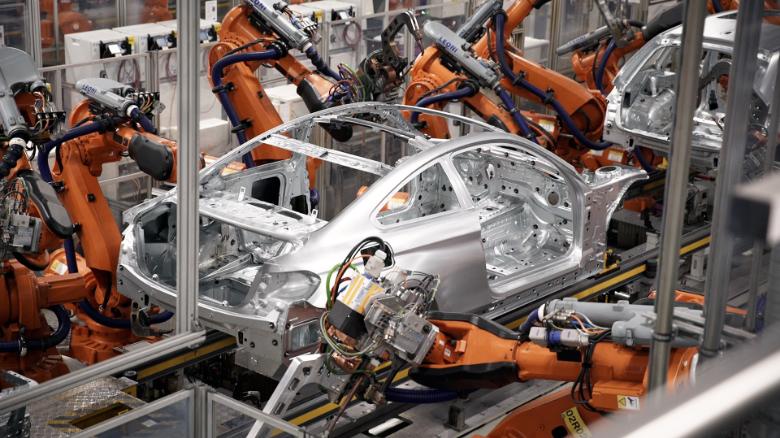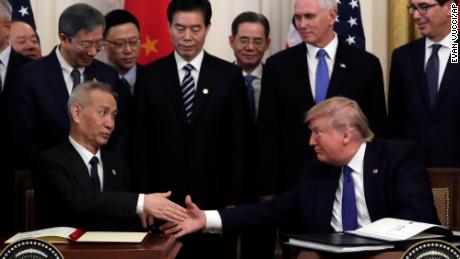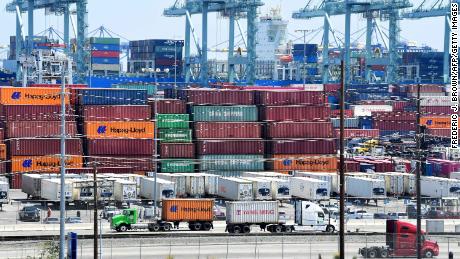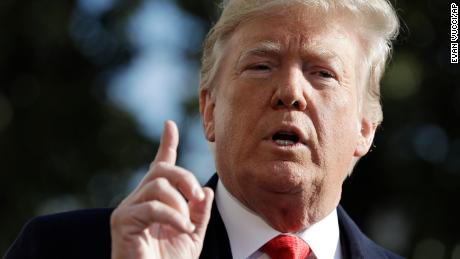New York (CNN Business)German car executives met with President Donald Trump Tuesday as his administration considers putting new tariffs on foreign vehicles and auto parts.
Earlier in the day, Commerce Secretary Wilbur Ross said it's a priority to reduce the trade deficit in cars and parts with Germany, preferably by increasing production by German automakers in the United States.
"On balance we're a big net importer of cars from Germany and parts for German cars both from Germany, from Austria and from Mexico," Ross said in an interview with CNBC's "Squawk Box." "It's a very, very important component of the European situation. And autos and auto parts are a big part of the global."
The push comes as the Trump administration is negotiating with China over trade, and days after Trump threatened to cancel the North American Free Trade Agreement if the US Congress refuses to ratify the replacement deal he signed this past weekend with his Canadian and Mexican counterparts.
Representatives from BMW (BMWYY), Daimler (DDAIF) and Volkswagen (VLKAF) visited the White House, where they met separately with Trump's top economic advisers.
In a statement made after the meeting, BMW hailed free trade, claiming the reduction in trade barriers has made its own success story in the United States possible. The automaker currently operates its biggest plant in the world in Spartanburg, South Carolina, where it employs about 10,000 people, and is considering building a second plant in the United States.
The company called the meeting with administration officials "constructive" but also made clear that trade talks should take place with the relevant political institutions.
Daimler ŌĆö which makes Mercedes ŌĆö and Volkswagen already have plants in southern states, too. They did not immediately respond to requests for comment after the meetings.
Trump has complained about the European Union's barriers on trade. He imposed tariffs on steel and aluminum imports from the region, and most of the world, earlier this year and the EU responded with retaliatory tariffs on a range of American goods ŌĆö including motorcycles, orange juice, bourbon, peanut butter, cigarettes and denim.
Trump, who called himself a "Tariff Man" in a tweet Tuesday, has argued that the duties encouraged Canada and Mexico to agree to the new US-Mexico-Canada Agreement, signed last week. He has also imposed tariffs on $250 billion of Chinese goods this year.
But in July, Trump and European Commission President Jean-Claude Juncker agreed to work toward eliminating all tariffs and barriers on trade.
"The president, as you know, has said that he will not impose tariffs on autos on the Europeans as long as negotiations with them are making good progress," Ross said on CNBC.
The Commerce Department has been investigating the effects of imposing tariffs on all foreign vehicles and auto parts since May. The report, which is under review by several federal agencies, could provide the administration with the legal justification for putting the duties in place, by arguing it's a national security issue.
In a comment filed with the Commerce Department in June, BMW argued against this justification for the tariffs, claiming that competition from foreign automakers does not threaten the national security of the United States.
"Removing both US and EU automotive duties entirely is in the best interest of German auto manufacturers, as it would save them an estimated €1 billion per year. We expect similar savings would be realized by US auto manufacturers as well," it said.
Earlier this week, Trump announced that Beijing will "reduce and remove" the tariffs it has on American cars and auto parts. But China has yet to confirm that commitment. Trade talks between the two economic powerhouses are ongoing and tariffs on other Chinese and American products remain in place.






















